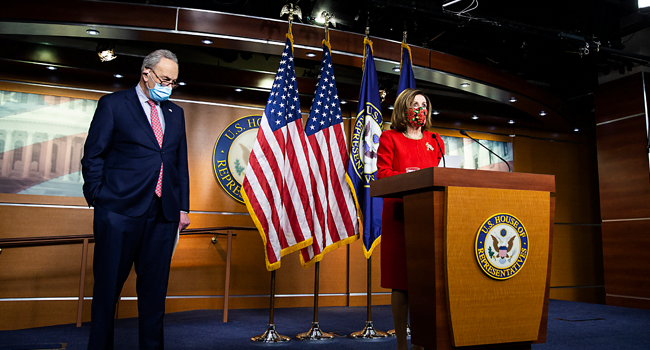
US lawmakers agreed on a nearly $900 billion Covid-19 relief package for millions of Americans on Sunday, in a deal that follows months of wrangling and comes as the nation battles the world’s largest coronavirus outbreak.
The package includes aid for vaccine distribution and logistics, extra jobless benefits of $300 per week, and a new round of $600 stimulus checks — half the amount provided in checks distributed in March under the CARES Act.
Months of partisan debate and finger-pointing, as well as last-minute negotiations, culminated in a deal lawmakers said they hoped to formally approve on Monday.
Talks had taken place amid a highly contentious campaign for the US presidency and Donald Trump’s subsequent refusal to concede defeat to Democrat Joe Biden.
“We’ve agreed to a package of nearly $900 billion. It is packed with targeted policies to help struggling Americans who have already waited too long,” Republican Senate majority leader Mitch McConnell said in a statement.
Democratic House Speaker Nancy Pelosi and Senate minority leader Chuck Schumer confirmed an agreement had been reached with Republicans and the White House on a deal that “delivers urgently needed funds to save the lives and livelihoods of the American people as the virus accelerates.”
The agreement also contains $25 billion in housing aid to prevent evictions and nearly $100 billion to help schools and childcare facilities re-open, a statement from Pelosi and Schumer said.
Congress was working under a deadline of midnight Sunday, needing to reach consensus to avoid a government shutdown.
Number two House Democrat Steny Hoyer said he expected the deal to pass on Monday and then head to the Senate.
That meant it required passage of a stopgap measure — which was signed by Trump late Sunday — to keep the federal government funded an extra 24 hours and avert a shutdown.
READ ALSO: US Signs Peace Deal With Afghanistan’s Taliban After 18 Years Of War
The House and Senate approved the stopgap measure earlier Sunday.
“The House will move swiftly to pass this legislation immediately, so it can quickly be sent to the Senate and then to the president’s desk for his signature,” Schumer and Pelosi said in a statement.
“With the horrifying acceleration of daily infections and deaths, there is no time to waste.”
In the wake of the deal, president-elect Biden — who has promised to pass another cash injection when he takes office in January — welcomed the agreement but said more will need to be done.
“Immediately, starting in the new year, Congress will need to get to work on support for our Covid-19 plan, for support to struggling families, and investments in jobs and economic recovery,” he said in a statement.
Battered economy
Democrats and Republicans have traded blame for months over the failure to reach a deal on this second relief plan — and continued to do so even after the deal was agreed on Sunday.
As the pandemic takes a record toll in US cases and deaths, the economy has been gravely battered, with jobless numbers rising in the past two weeks.
Making matters worse, millions of Americans were poised to lose jobless benefits after Christmas, and federal moratoria on evictions and repayment of student loans are set to expire at the end of the month.
New assistance for struggling businesses and the unemployed is seen as critical to getting the world’s biggest economy back on its feet, while new vaccines offer hope that an end to the pandemic may be in sight.
The initial $2.2 trillion package passed in March was credited with preventing a much more severe economic downturn.
It included huge amounts to rescue American companies, including $377 billion in grants to small businesses to pay workers and rent, $500 billion for loans to larger businesses and states and nearly $600 billion in tax breaks and deferrals.
But critics said too much assistance went to big corporations and not enough to ordinary Americans and small businesses.
On Wednesday, Federal Reserve chairman Jerome Powell stressed the high risk that countless small businesses could go bust in the absence of new federal aid.
The Fed has estimated that the jobless rate will end the year at 6.7 percent before dipping to 5 percent next year — still a long way from the 3.5 percent registered in February.
AFP
